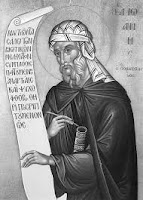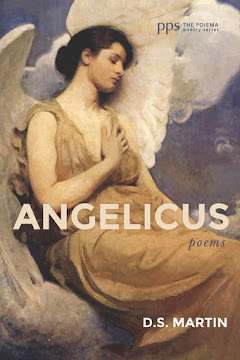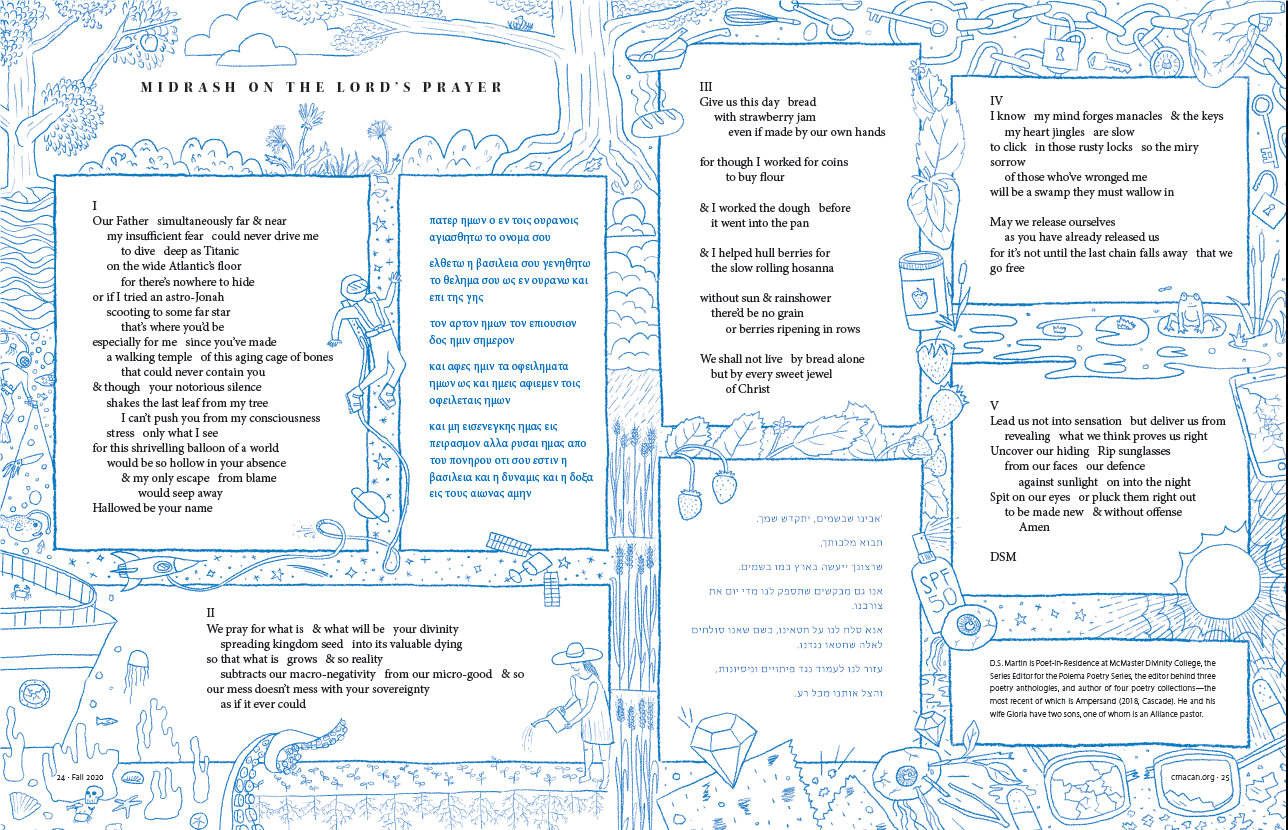John Slater is a Trappist monk at the Abbey of the Genesee in New York State. His most recent book is Beyond Measure: The Poetics of the Image in Bernard of Clairvaux (2020, Cistercian Publications). That book is written under the name of Isaac Slater, which is the name he’s known by at the Abbey. His poetry collections have been published under his birth name ― John Slater.
The following poem was presented through a video reading by Slater, to accompany the first station in the Crossings Toronto Arts Exhibition which was presented by Imago in central Toronto from March 2 to April 14, 2022. The sixteen poems, and sixteen accompanying pieces of visual art appear in the Crossings Catalogue.
Among the sixteen Canadian poets included in Crossings Toronto are, Sarah Klassen, John Terpstra, D.S. Martin, and Sally Ito.
I encourage readers to seek out a copy, and to use this resource for devotional reflections throughout Lent and Easter for many years to come.
Entry to Jerusalem (King of Peace)
Somber Palm
Sunday all
over the
world—streets
and churches
empty.
*
He comes! they
spill out from
the City
hosanna!
scramble up
palm trees hack
off branches
wrestle from
cloaks to fling
at his feet
joyous o-
vation for
the people’s
champion
head down meek
riding a
donkey—led
into the
ring—his face
set like flint.
*
The children
swept up in
their parents’
ecstasy
dart thru crowd
cut palm wave
branches shout
hosanna!
this strange king
like them with
no standing.
*
Before the
crown of thorns
purple robe
torture—be-
comes his own
parody
of Herod
and Pilate
So you are
a king? no
followers
defending
his kingdom
by force he
shall banish
chariot
and horse the
warrior’s
bow king of
suffering
king of peace.
*
Monks process
into an
empty church
palm fronds poke
discreetly
from choir stalls
spray from vase
near altar
the chant less
exultant
than serene
and yet still
carpeting
the Master’s
path with song.
Posted with permission of the poet.
*This is the second Kingdom Poets post about John Slater: first post.
Entry written by D.S. Martin. He is the author of five poetry collections including Angelicus (2021, Cascade) ― a book of poems written from the point-of-view of angels. His books are available through Wipf & Stock.
Monday, March 27, 2023
Monday, March 20, 2023
Frederick William Faber
Frederick William Faber (1814―1863) is best known as a theologian and hymnist. He was born in Yorkshire into a Calvinist family of Huguenot descent, but as a student at Oxford University became greatly influenced by John Henry Newman. During this time he took extended vacations in the Lake District, to write poetry, and wrestle through theological issues. There he was befriended by William Wordsworth.
While a student at Oxford, Faber won the Newdigate Prize for poetry, which has also been won by such poets as Matthew Arnold and Oscar Wilde. He was ordained in the Church of England in 1839, however, in 1845 both he and Newman left to join the Catholic Church.
As was common for 19th century Christian poets, Faber wrote much of his verse in the form of hymns. Perhaps his best-known is — ironically — “Faith of Our Fathers.” By the twentieth century, however, this hymn was being included in Protestant hymnbooks, and A.W. Tozer included twenty pieces by Faber in his anthology, The Christian Book of Mystical Verse (1963).
The Eternity of God
O Lord! my heart is sick,
Sick of this everlasting change;
And life runs tediously quick
Through its unresting race and varied range:
Change finds no likeness to itself in Thee,
And wakes no echo in Thy mute eternity.
Dear Lord! my heart is sick
Of this perpetual lapsing time,
So slow in grief, in joy so quick,
Yet ever casting shadows so sublime:
Time of all creatures is least like to Thee,
And yet it is our share of Thine eternity.
Oh change and time are storms,
For lives so thin and frail as ours;
For change the work of grace deforms
With love that soils, and help that overpowers;
And time is strong, and, like some chafing sea,
It seems to fret the shores of Thine eternity.
Weak, weak, for ever weak!
We cannot hold what we possess;
Youth cannot find, age will not seek, —
Oh weakness is the heart's worst weariness:
But weakest hearts can lift their thoughts to Thee;
It makes us strong to think of Thine eternity.
Thou hadst no youth, great God!
An Unbeginning End Thou art;
Thy glory in itself abode,
And still abides in its own tranquil heart:
No age can heap its outward years on Thee:
Dear God! Thou art Thyself Thine own eternity!
Without an end or bound
Thy life lies all outspread in light;
Our lives feel Thy life all around,
Making our weakness strong, our darkness bright;
Yet is it neither wilderness nor sea,
But the calm gladness of a full eternity.
Oh Thou art very great
To set Thyself so far above!
But we partake of Thine estate,
Established in Thy strength and in Thy love:
That love hath made eternal room for me
In the sweet vastness of its own eternity.
Oh Thou art very meek
To overshade Thy creatures thus!
Thy grandeur is the shade we seek;
To be eternal is Thy use to us:
Ah, Blessed God! what joy it is to me
To lose all thought of self in Thine eternity.
Self-wearied, Lord! I come;
For I have lived my life too fast:
Now that years bring me nearer home
Grace must be slowly used to make it last;
When my heart beats too quick I think of Thee,
And of the leisure of Thy long eternity.
Farewell vain joys of earth!
Farewell, all love that is not His!
Dear God! be Thou my only mirth,
Thy majesty my single timid bliss!
Oh in the bosom of eternity
Thou dost not weary of Thyself, nor we of Thee!
Entry written by D.S. Martin. He is the author of five poetry collections including Angelicus (2021, Cascade) ― a book of poems written from the point-of-view of angels. His books are available through Wipf & Stock.
While a student at Oxford, Faber won the Newdigate Prize for poetry, which has also been won by such poets as Matthew Arnold and Oscar Wilde. He was ordained in the Church of England in 1839, however, in 1845 both he and Newman left to join the Catholic Church.
As was common for 19th century Christian poets, Faber wrote much of his verse in the form of hymns. Perhaps his best-known is — ironically — “Faith of Our Fathers.” By the twentieth century, however, this hymn was being included in Protestant hymnbooks, and A.W. Tozer included twenty pieces by Faber in his anthology, The Christian Book of Mystical Verse (1963).
The Eternity of God
O Lord! my heart is sick,
Sick of this everlasting change;
And life runs tediously quick
Through its unresting race and varied range:
Change finds no likeness to itself in Thee,
And wakes no echo in Thy mute eternity.
Dear Lord! my heart is sick
Of this perpetual lapsing time,
So slow in grief, in joy so quick,
Yet ever casting shadows so sublime:
Time of all creatures is least like to Thee,
And yet it is our share of Thine eternity.
Oh change and time are storms,
For lives so thin and frail as ours;
For change the work of grace deforms
With love that soils, and help that overpowers;
And time is strong, and, like some chafing sea,
It seems to fret the shores of Thine eternity.
Weak, weak, for ever weak!
We cannot hold what we possess;
Youth cannot find, age will not seek, —
Oh weakness is the heart's worst weariness:
But weakest hearts can lift their thoughts to Thee;
It makes us strong to think of Thine eternity.
Thou hadst no youth, great God!
An Unbeginning End Thou art;
Thy glory in itself abode,
And still abides in its own tranquil heart:
No age can heap its outward years on Thee:
Dear God! Thou art Thyself Thine own eternity!
Without an end or bound
Thy life lies all outspread in light;
Our lives feel Thy life all around,
Making our weakness strong, our darkness bright;
Yet is it neither wilderness nor sea,
But the calm gladness of a full eternity.
Oh Thou art very great
To set Thyself so far above!
But we partake of Thine estate,
Established in Thy strength and in Thy love:
That love hath made eternal room for me
In the sweet vastness of its own eternity.
Oh Thou art very meek
To overshade Thy creatures thus!
Thy grandeur is the shade we seek;
To be eternal is Thy use to us:
Ah, Blessed God! what joy it is to me
To lose all thought of self in Thine eternity.
Self-wearied, Lord! I come;
For I have lived my life too fast:
Now that years bring me nearer home
Grace must be slowly used to make it last;
When my heart beats too quick I think of Thee,
And of the leisure of Thy long eternity.
Farewell vain joys of earth!
Farewell, all love that is not His!
Dear God! be Thou my only mirth,
Thy majesty my single timid bliss!
Oh in the bosom of eternity
Thou dost not weary of Thyself, nor we of Thee!
Entry written by D.S. Martin. He is the author of five poetry collections including Angelicus (2021, Cascade) ― a book of poems written from the point-of-view of angels. His books are available through Wipf & Stock.
Monday, March 13, 2023
John of Damascus
John of Damascus (c. 675―749) is a Byzantine Greek monk, priest, theologian and poet ― born and raised in Damascus, but who lived most of his life in monasteries near Jerusalem.
He is particularly known for his defense of the use of icons. Images of Christ and of the saints were, and continue to be, central to Orthodox worship. This was against the iconoclastic campaigns Emperor Leo III started in 726. John of Damascus argued, that although the Old Testament prohibited graven images, when Christ came in the flesh as “the image of the invisible God” such restrictions were no longer applicable. His writings played a significant role during the Second Council of Nicaea (787), which convened to settle this dispute.
The following is an excerpt from Christopher Childers' translation of “Paschal Canon” which can be read in its entirety in the new anthology To Heaven’s Rim: The Kingdom Poets Book of World Christian Poetry, Beginnings to 1800, in English Translation, which was edited by Burl Horniachek. I am fortunate enough to have worked alongside Burl in the completion of this significant work.
from Paschal Canon
The day of resurrection, may all God’s people brim
------------------with light. The Lord’s Passover!
From out of death to life, from Earth to heaven’s rim,
------------------we’re borne by the Prime Mover
our God Christ, as we sing out his victory hymn.
May all our senses be perfected; may we see,
------------------in resurrection’s sheer
untouchable brightness, Christ the Lightning, and may we
------------------perceive His voice, and hear
His ringing welcome, while we hymn His victory.
Let fitting celebrations exalt the smiling skies;
------------------let raptures seize the earth.
Let all the seen and unseen cosmos melt in cries
------------------of universal mirth.
The transport of the ages, Christ, awakes to rise.
Entry written by D.S. Martin. He is the author of five poetry collections including Angelicus (2021, Cascade) ― a book of poems written from the point-of-view of angels. His books are available through Wipf & Stock.
He is particularly known for his defense of the use of icons. Images of Christ and of the saints were, and continue to be, central to Orthodox worship. This was against the iconoclastic campaigns Emperor Leo III started in 726. John of Damascus argued, that although the Old Testament prohibited graven images, when Christ came in the flesh as “the image of the invisible God” such restrictions were no longer applicable. His writings played a significant role during the Second Council of Nicaea (787), which convened to settle this dispute.
The following is an excerpt from Christopher Childers' translation of “Paschal Canon” which can be read in its entirety in the new anthology To Heaven’s Rim: The Kingdom Poets Book of World Christian Poetry, Beginnings to 1800, in English Translation, which was edited by Burl Horniachek. I am fortunate enough to have worked alongside Burl in the completion of this significant work.
from Paschal Canon
The day of resurrection, may all God’s people brim
------------------with light. The Lord’s Passover!
From out of death to life, from Earth to heaven’s rim,
------------------we’re borne by the Prime Mover
our God Christ, as we sing out his victory hymn.
May all our senses be perfected; may we see,
------------------in resurrection’s sheer
untouchable brightness, Christ the Lightning, and may we
------------------perceive His voice, and hear
His ringing welcome, while we hymn His victory.
Let fitting celebrations exalt the smiling skies;
------------------let raptures seize the earth.
Let all the seen and unseen cosmos melt in cries
------------------of universal mirth.
The transport of the ages, Christ, awakes to rise.
Entry written by D.S. Martin. He is the author of five poetry collections including Angelicus (2021, Cascade) ― a book of poems written from the point-of-view of angels. His books are available through Wipf & Stock.
Monday, March 6, 2023
Anna Akhmatova*
Anna Akhmatova (1889—1966) is a Russian poet who lived most of her life in Saint Petersburg. Her first poetry collection, Evening (1912), established her as a significant poet, and her next two books Rosary (1914) and White Flock (1917) continued to build her reputation.
After the Russian Revolution of 1917, Akhmatova chose to remain in Russia even as other writers were fleeing to the West. Requiem, which she primarily wrote between 1935 and 1940, at first was about the arrest of her common-law husband Nikolay in 1935, but then became even more about the arrest of their son Lev in 1938 and his subsequent trial and sentencing.
The following is the tenth section from Requiem as translated by Stephen Capas. It appeared in the literary journal Cardinal Points in 2021.
Crucifixion
1
Don’t weep for me, Mother,
As I lie in my grave.
Choirs of angels hymned the glorious hour,
Dissolved in flame, the heavens glowed overhead.
“Why hast though forsaken me, my Father?”
And “Mother, do not weep for me,” he said.
2
Magdalen sobbed and wrung her hands in anguish,
The disciple whom he loved was still as stone.
But no one dared to look toward the place where
The Mother stood in silence, all alone.
1940-43
This post was suggested by my friend Burl Horniachek.
*This is the second Kingdom Poets post about Anna Akhmatova: first post.
Entry written by D.S. Martin. He is the author of five poetry collections including Angelicus (2021, Cascade) ― a book of poems written from the point-of-view of angels. His books are available through Wipf & Stock.
After the Russian Revolution of 1917, Akhmatova chose to remain in Russia even as other writers were fleeing to the West. Requiem, which she primarily wrote between 1935 and 1940, at first was about the arrest of her common-law husband Nikolay in 1935, but then became even more about the arrest of their son Lev in 1938 and his subsequent trial and sentencing.
The following is the tenth section from Requiem as translated by Stephen Capas. It appeared in the literary journal Cardinal Points in 2021.
Crucifixion
1
Don’t weep for me, Mother,
As I lie in my grave.
Choirs of angels hymned the glorious hour,
Dissolved in flame, the heavens glowed overhead.
“Why hast though forsaken me, my Father?”
And “Mother, do not weep for me,” he said.
2
Magdalen sobbed and wrung her hands in anguish,
The disciple whom he loved was still as stone.
But no one dared to look toward the place where
The Mother stood in silence, all alone.
1940-43
This post was suggested by my friend Burl Horniachek.
*This is the second Kingdom Poets post about Anna Akhmatova: first post.
Entry written by D.S. Martin. He is the author of five poetry collections including Angelicus (2021, Cascade) ― a book of poems written from the point-of-view of angels. His books are available through Wipf & Stock.
Subscribe to:
Posts (Atom)






















